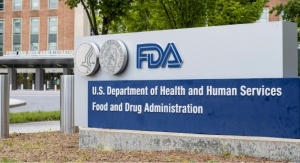10.10.17
“The best way to improve dietary intake is diversification, fortification, and supplementation,” said Regan Bailey, PhD, RD, MPH, associate professor, Department of Nutrition Science, Purdue University, at the 31st Congressional Dietary Supplement Caucus briefing held recently on Capitol Hill. Speaking before an audience of more than 60 Congressional staffers and guests, Dr. Bailey discussed dietary supplement use and nutrient intakes in U.S. adults, as well as ways to improve nutritional habits and access to products that will help them achieve their health and wellness goals.
“We always recommend food first,” advised Dr. Bailey. “However, research shows that, overwhelmingly, adults fail to exceed the recommended daily value of any vitamin or mineral from foods alone. For this reason, we must find ways to incorporate these vital nutrients into our diets—and taking a dietary supplement, like a multivitamin, is a great step to take.”
At the briefing, Dr. Bailey presented research on dietary supplement usage across the spectrum of specific American populations. She noted that adults who use dietary supplements differ from those who do not in a number of ways, including age, gender, race, and socioeconomic status.
“A clear pattern that always emerges in almost every cohort that I have ever seen is that the use of dietary supplements increases with the amount of money a person or family has,” said Dr. Bailey. “Many Americans live in communities that lack accessible, affordable healthy food options. By increasing access to dietary supplements among those most at risk for micronutrient deficiency, especially those of lower socioeconomic status, we can ensure all Americans are getting the nutrients they need to live healthier lives.”
Dr. Bailey’s presentation dovetails with legislation recently introduced in Congress, the SNAP Vitamin and Mineral Improvement Act (HR 3841), which allows for the inclusion of a multivitamin under Supplemental Nutrition Assistance Program (SNAP) benefits. Dietary supplements such as the multivitamin are useful in providing nutrients that otherwise may be consumed in less-than-recommended amounts, and HR 3841 would empower SNAP recipients to make the choice to purchase the dietary supplements they need to live healthier, more nutrient-rich lives.
The educational event was sponsored by the bipartisan, bicameral Dietary Supplement Caucus with help from trade associations representing the dietary supplement industry—the American Herbal Products Association (AHPA), the Consumer Healthcare Products Association (CHPA), the Council for Responsible Nutrition (CRN), the Natural Products Association (NPA), and the United Natural Products Alliance (UNPA).
“We always recommend food first,” advised Dr. Bailey. “However, research shows that, overwhelmingly, adults fail to exceed the recommended daily value of any vitamin or mineral from foods alone. For this reason, we must find ways to incorporate these vital nutrients into our diets—and taking a dietary supplement, like a multivitamin, is a great step to take.”
At the briefing, Dr. Bailey presented research on dietary supplement usage across the spectrum of specific American populations. She noted that adults who use dietary supplements differ from those who do not in a number of ways, including age, gender, race, and socioeconomic status.
“A clear pattern that always emerges in almost every cohort that I have ever seen is that the use of dietary supplements increases with the amount of money a person or family has,” said Dr. Bailey. “Many Americans live in communities that lack accessible, affordable healthy food options. By increasing access to dietary supplements among those most at risk for micronutrient deficiency, especially those of lower socioeconomic status, we can ensure all Americans are getting the nutrients they need to live healthier lives.”
Dr. Bailey’s presentation dovetails with legislation recently introduced in Congress, the SNAP Vitamin and Mineral Improvement Act (HR 3841), which allows for the inclusion of a multivitamin under Supplemental Nutrition Assistance Program (SNAP) benefits. Dietary supplements such as the multivitamin are useful in providing nutrients that otherwise may be consumed in less-than-recommended amounts, and HR 3841 would empower SNAP recipients to make the choice to purchase the dietary supplements they need to live healthier, more nutrient-rich lives.
The educational event was sponsored by the bipartisan, bicameral Dietary Supplement Caucus with help from trade associations representing the dietary supplement industry—the American Herbal Products Association (AHPA), the Consumer Healthcare Products Association (CHPA), the Council for Responsible Nutrition (CRN), the Natural Products Association (NPA), and the United Natural Products Alliance (UNPA).



























